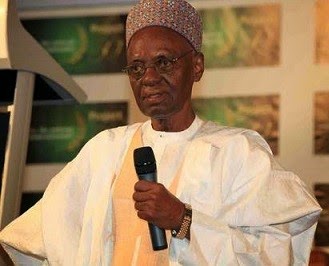Second Republic and first executive President of Nigeria, Alhaji Shehu Shagari, is happy that the country has witnessed 16 years of unbroken democratic rule and wants the trend sustained.
The octogenarian, who will be 90 years on February 25, said the country is maturing politically and commended President Goodluck Jonathan for promoting the unity of the country.
The former president, who was toppled on December 31, 1983 by the Major-General Muhammadu Buhari (retd) military coup stressed the need to strengthen our democratic, saying: “I sincerely could never have imagined that in my life time, under constitutional rule, with a deep and broad mandate, a zoologist from Bayelsa, one of our youngest states, could rise to become Commander-in-Chief.
“There is no better indicator that, while much remains to be achieved, our beloved Nigeria is slowly but surely maturing politically. Almost unwittingly, we are strengthening our democratic practice.
And we must acknowledge and be thankful of the fact that Jonathan has taken it upon himself to diligently promote one Nigeria not only in words but in action.”
Shagari conveyed the thoughts through his foreword to the book; “Jonathan: A Photographic Journey to the Presidency,” which was circulated, weekend, in Lagos when President Jonathan took his re-election campaign to the top echelon of the country’s business community.
In the seven-paragraph foreword to the 398-page book, Shagari, who recalled Jonathan’s topsy-turvy journey to power, said the president’s accelerated electoral reforms and political will ensured that the 2011 general polls were credible and peaceful.
His words: “Without the acceleration of electoral reforms achieved as a result of President Jonathan’s political will, the Independent National Electoral Commission, INEC, would not have been able to guarantee relatively free and fair elections in 2011.
Much remains to be done
“While the Jonathan administration lays claim, and rightly so, for assuring that INEC could carry out its work unimpeded by what had become almost routine ‘bottlenecks’ and practices in the administration of Nigerian elections hitherto, we must not forget the role popular opinion played as well. Much remains to be done, but we are now more confident that INEC can become an effective and independent institution.”
On the book, he said: “As I looked through the book, I was reminded of the responsibilities and roles our leaders undertake daily to help move our beloved nation forward. In the case of President Jonathan, a lot has been said and written about his style, strategy and keenness. Anyone who picks up at this book will surely appreciate how hard he works, how earnest he is and how much energy and bonhomie he brings along with him.
“The book also reminds me of how much Nigeria’s states and communities are inter-linked in so many ways. This is a reminder of the role citizens play in securing democracy and democratic institutions. And Indeed Nigerians have been at the forefront in ensuring that ‘things’ get better.
“Most of all, I was reminded how much, over the past four years, our young democracy has grown in terms of tolerance and inclusion which embraces, accepts and celebrates our diverse cultures and communities.”
The elder statesman hoped that the book will lead to the production of more books with stories “that will heighten our collective understanding of how our democracy is being built. Stories that will remind us of how far we have come. Stories that will inspire us to continue to hold our political leaders accountable for ensuring that Nigeria delivers the basic needs of Nigerians, and that it takes on its global responsibilities and leadership with same sense of focus with which it is nurturing and building its democratic traditions.”
(adsbygoogle = window.adsbygoogle || []).push({});


